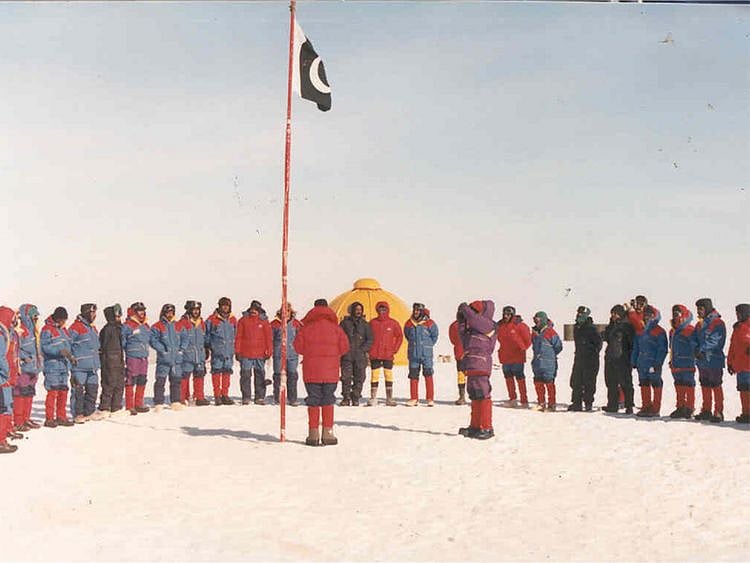Pakistan eager to revive Antarctic expedition
Scientists keen to resume scientific exploration in the region

Islamabad: Pakistani researchers are keen to revive scientific exploration in the Antarctic region – the coldest, driest and windiest place in the world. Officials have expressed a desire to revitalize expeditions in Antarctica by Pakistani scientists in collaboration with friendly countries.
Pakistan’s Antarctic Programme started nearly three decades back after the country sent its first expedition to the South Pole, backed by the National Institute of Oceanography (NIO) that was established in 1981 by the Ministry of Science and Technology.
Pakistan’s first Antarctic expedition
In the early 1990s, “Pakistan became the first country in the Islamic world to send its expeditions to the Antarctic with its top scientists and logistic personals. It was a huge success,” said Dr Hina Saeed Baig, Director General of NIO while talking to Gulf News. Dr Baig was among the core group of scientists and first woman to join Pakistan’s Antarctic initiative.
During 1991 and 1993, Pakistan established two scientific research stations, Jinnah Antarctic Station I and II, and an automatic weather station called Iqbal Observatory on Sor Rondane Mountain. This achievement earned Pakistan the associate membership of Scientific Committee on Antarctic Research (SCAR) in 1992. More recently, Pakistani scientists have also participated in Chinese expeditions in Antarctica.
Future investment
No independent expedition was sent by Pakistan after 1993 reportedly due to lack of funds and the government’s attention. “Scientific research in Antarctica is a future investment for any government that offers manifold opportunities and benefits technologically, economically and even diplomatically,” explained Dr Hina Baig. “Pakistan’s Antarctic Programme is more than just a national achievement as it offers long-term benefits, elevates the country’s status and helps improve local expertise and technology.”
Pakistan became a non-consultative member of the exclusive Antarctic Treaty in 2011 that can facilitate Pakistani scientists to actively pursue their investigation in the region and develop collaborations, conduct joint expeditions and receive support from other countries involved in Antarctic research. The areas that will get benefit from Antarctic research are:
• Oil and gas
• Hydrographic surveys
• Seabed mineral resources
• Extraction of pure compounds
• Freshwater reserves
• Exploitation of living and non-living resources
• Global warming and environmental studies
• International laws related to Antarctica, rules and conventions and the rights and obligations that evolve from them.
Pakistan’s focus in the Antarctic
Over the years, Pakistani scientists have achieved sufficient experience and capabilities to conduct research in the harsh Antarctic environment. Dr Hina Baig elaborated that Pakistan’s mission is focused on:
1. To undertake multidisciplinary research and survey in the Antarctic region particularly in the field of geoscience, glaciology, atmospheric dynamics, understanding climate change, polar ecosystems, fisheries, food web, polar biology, environmental science, cold adaptability of human beings and medicines as well as biogeochemical fluxes of carbon, nitrogen, silica and iron in the Southern Ocean and its influence.
2. To take part in international scientific collaboration in the Antarctic region.
3. To encourage the new generation of polar scientists, engineers and leaders to provide relevant technical information to the government for appropriate decision making at the national and international level.
Study weather and climate change
Another subject recently added to the exploration is the impact of climate change – one of the biggest threats to any agricultural country like Pakistan. “Given the rising challenges of climate change and the fact that Pakistan lies at the base of the highly vulnerable and fast melting Third Pole (the Himalayan glaciers) it is essential that this program is reignited and expanded to ensure credible and real-time climate research linkages between these two highly sensitive and vulnerable areas” Special Assistant to the Prime Minister on Climate Change, Malik Amin Aslam, told Gulf News. “This research linkage can also help the world understand the complex but unpredictable realities of climate change.”
Significance of Antarctic region
Antarctica, the land of icebergs, has attracted global attention for its pristine environment, the huge potential for non-living and living resources under the ice, its influence on global weather system and unique location that makes it a prime natural laboratory for scientific research. The Antarctic ice sheet contains about 90 percent of Earth’s total ice and 70 percent of its freshwater. Antarctic region is used exclusively for peaceful purposes. The Antarctic Treaty that came into effect in 1961, and now has 54 members, forbids military activities and the exploitation of Antarctica's mineral reserves.
Sign up for the Daily Briefing
Get the latest news and updates straight to your inbox
Network Links
GN StoreDownload our app
© Al Nisr Publishing LLC 2025. All rights reserved.